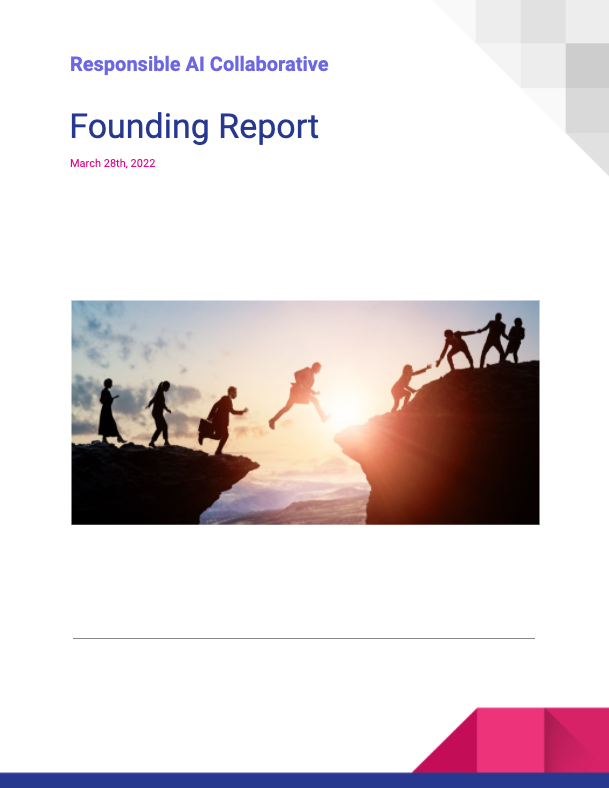約
なぜ「AIインシデント」なのか?
インテリジェントシステムは、現実世界に展開される際、予期せぬ、そしてしばしば危険な故障を起こしやすい状況にあります。かつての交通分野(例:FAAやFARS)や、より最近ではコンピュータシステムと同様に、インテリジェントシステムも、将来の研究者や開発者が悪い結果の繰り返しを軽減または回避できるよう、現実世界で経験した問題のリポジトリを必要としています。
インシデントとは何か?
初期の1,000件以上のインシデント報告は、意図的に幅広い性質のものとなっています。現在の例には以下が含まれます:
- 自動運転車が歩行者を死亡させる
- 取引アルゴリズムが市場の「フラッシュクラッシュ」を引き起こし、数十億ドルが当事者間で移動する
- 顔認識システムが無実の人を逮捕させる
これまでに収集されたインシデントの探索、完全なリストの閲覧、追加�のインシデント報告の提出をお勧めします。研究者の方々には、AIインシデントの実用的な定義のレビューをお勧めします。
現在と将来のユーザー
このデータベースは、常に進化し続けるデータプロダクトとアプリケーションのコレクションです。
- 現在のユーザーには、システムアーキテクト、産業製品開発者、広報マネージャー、研究者、公共政策研究者、一般市民が含まれます。これらのユーザーは、Discoverアプリケーションを使用して、最近展開されたインテリジェントシステムが現実世界でどのように予期しない結果を生み出したかを積極的に発見することができます。そうすることで、将来同様の過ちを回避できる可能性があります。
- 将来の用途は、追加のデータベースサマリーや分類体系を含む、オープンソースコミュニティのコード貢献を通じて進化していきます。
インシデントを報告すべきタイミング
イベントがインシデントとして適格かどうか疑問がある場合は、ぜひ提出してください!このプロジェクトは、より広いコミュニティから提出された候補インシデントの探索を通じて、インシデントを取り込むための共有基準に収束することを目的としています。
取締役会
インシ��デントデータベースは、コード、研究、より広範な影響を提供する個人や組織によって参加型で管理されています。プロジェクトのガバナンスに参加したい場合は、お問い合わせいただき、AIインシデントデータベースへの貢献意図をお知らせください。
投票メンバー
-
Patrick Hall: PatrickはAIとデータ分析を専門とするワシントンD.C.拠点の法律事務所bnh.aiの主任科学者を最近務めていました。Patrickはジョージワシントン大学ビジネススクールの助教授でもあります。bnh.aiの共同設立前、Patrickは機械学習ソフトウェア企業H2O.aiで責任あるAIの取り組みを主導し、その作業は説明可能で公正な機械学習のための世界初の商用ソリューションの1つをもたらしました。その他の学術的および技術メディアの執筆の中で、Patrickは説明可能で責任ある機械学習に関する人気のある電子書籍の主要著者です。Patrickはイリノイ大学で計算化学を学び、ノースカロライナ州立大学の高度分析研究所を卒業しました。 貢献: PatrickはAIインシデントデータベースへのインシデント報告の主要な貢献者であり、取締役会に戦略的リーダーシップを提供しています。
-
Heather Frase: Heather Frase博士は、ジョージタウンのセキュリティ・新興技術センター(CSET)のシニアフェローで、AI評価に取り組んでいます。また、国立標準技術研究所のAIリスク管理フレームワークの実装に関する専門�知識を提供し、MetaのOpen Loopプロジェクトの無給アドバイザーも務めています。CSETに参加する前、Heatherは8年間、インテリジェンス、防衛、連邦契約のためのデータ分析、計算モデリング、機械学習(ML)、人工知能(AI)のサポートを提供していました。さらに、Heatherは防衛分析研究所(IDA)で14年間、運用試験評価局長(DOT&E)を支援しました。IDAでは、主要防衛システムの運用試験のためのデータメトリクスと収集計画を開発し、試験データを分析し、運用効果と適合性の評価を作成するために、科学的、技術的、統計的専門知識を適用する分析研究チームを率いていました。カリフォルニア工科大学で材料科学の博士号を、オハイオ州オックスフォードのマイアミ大学で物理学の学士号を取得しています。 貢献: HeatherはAIインシデント研究を開発し、CSET分類体系の監督も行っています。
-
Kristian J. Hammond: Kris Hammondはノースウェスタン大学のBill and Cathy Osbornコンピューターサイエンス教授であり、最近Salesforceに買収された人工知能企業Narrative Scienceの共同創設者です。また、法律、医学、教育、ビジネスなどの分野を計算思考でどのように変革できるかを探求するノースウェスタンのCS + Xイニシアチブのファカルティリードも務めています。ノースウェスタンの人工知能理学修士(MSAI)のディレクターです。最近では、Hammond博士はUnderwriter's Laboratoriesの資金提供を受けた研究拠点である機械知能安全性推進センター(CASMI)を設立しました。CASMI�は、人間の生命と安全への影響の観点から、AIシステムの設計と評価の運用化に焦点を当てています。 貢献: Krisはインシデントのケーススタディを中心とした共同プロジェクトを開発しています。
名誉取締役会
名誉取締役会メンバーは、Responsible AI Collaborativeへのサービスで特に際立った活躍をした人々です。組織内でガバナンスの役職は持っていません。
-
Sean McGregor: Sean McGregorはAIインシデントデータベースプロジェクトを設立し、最近デジタル安全研究所に創設ディレクターとして参加しました。Responsible AI Collaborativeを開始する前、Seanはニューラルアクセラレータのスタートアップ企業Syntiantの機械学習アーキテクトの職を離れ、インテリジェントシステムの保証にフルタイムで専念できるようにしました。McGregor博士の仕事は、エネルギー効率の高い推論のためのニューラルアクセラレータ、音声と太陽物理学のための深層学習、山火事抑制政策のための強化学習にわたっています。有給の仕事以外では、Seanは主要な学術AI会議で「AI for Good」というトピックに関する一連のワークショップを開催し、現在はAIインシデント記録をAIテストプログラムに橋渡しすることで、AIの利益を安全に実現しようとしています。
-
Helen Toner: Helen Tonerはジョージタウンのセキュリティ・新興技術センター(CSET)の戦略ディレクターです。以前はOpen Philanthropyでシニアリサーチアナリストとして働き、政策立案者と助成金��提供者にAI政策と戦略についてアドバイスしていました。Open Philanthropyでの勤務とCSETへの参加の間、Helenは北京に住み、オックスフォード大学のAIガバナンスセンターのリサーチアフィリエイトとして中国のAIエコシステムを研究していました。HelenはForeign Affairsやその他の媒体で、中国と米国のAIと機械学習の国家安全保障への影響について執筆し、米中経済安全保障審査委員会で証言しています。OpenAIの取締役会メンバーです。Helenはジョージタウンで安全保障研究の修士号を、メルボルン大学で化学工学の理学士号と言語学のディプロマを取得しています。
協力者
Responsible AI Collaborative: AIインシデントデータベースの背後にある組織に奉仕する人々。
- 取締役会メンバーにはPatrick Hall、Heather Frase、Kristian J. Hammondが含まれます。経歴は上記に記載されています。
- Sean McGregorはエグゼクティブディレクターです。
- Daniel AthertonはAIインシデントのリードエディターです。
Responsible AI Collaborativeとの正式な提携関係を持たない多くの追加の人々や組織がプロジェクトに貢献しています。
デジタル安全研究所(DSRI): AIIDプログラムに実質的なサポートを提供するDSRIに所属する人々。
- Kevin PaethはDSRIのリード
- César Varelaはフルスタックエンジニア
- Luna McNultyはUXエンジニア
- Pablo Costaはフルスタックエンジニア
- Clara Youdale Pinelliはフロントエンドエンジニア
- Sean McGregorはDSRIのディレクター
インシデントエディター: データベースへのインシデント提出を解決し、それらを維持する人々。
さらに、Zachary Arnoldはインシデント基準に重要な貢献をしました。
分類体系エディター: データベースに分類体系を提供した組織または個人。
オープンソース貢献者: AIインシデントデータベースに複数のプルリクエスト、グラフィック、サイトコピー、またはバグレポートを提供した人々。
- Neama Dadkhahnikoo:NeamaはResponsible AI Collaborativeのボランティアエグゼクティブディレクターおよびボードオブザーバーを務めました
- Jingying YangとDr. Christine CustisはPartnership on AIでの役割を通じてAIIDの初期段階に大きく貢献しました
- Khoa Lam:データエディターを務めました
- Kate Perkins:データエディターを務めました
- Scott Allen Cambo:ScottはResponsible AI Collaborativeのエグゼクティブディレクターを以前務めました
- Janet Boutilier Schwartz:JanetはResponsible AI Collaborativeで運営と戦略についてコンサルティングを以前行いました
- Kit Harris:Kitはボードオブザーバーを務め、助成金アドバイザーとしての立場から戦略的アドバイスを提供しました
- Alex Muscă
- Chloe Kam AIIDロゴを開発
- JT McHorse
- Seth Reid
インシデント貢献者: データベースに多数のインシデントを提供した人々。
- Roman Lutz (Max Planck Institute for Intelligent Systems、以前はMicrosoft)
- Patrick Hall (Burt and Hall LLP)
- Catherine Olsson (Google)
- Roman Yampolskiy (University of Louisville)
- Sam Yoon (PAIへのコントラクター、その後Deloitte Consulting、その後Kennedy School of Government)
以下の人々は、取り込み待ちの多数のインシデントを収集しています。
- Zachary Arnold、Helen Toner、Ingrid Dickinson、Thomas Giallella、Nicolina Demakos(ジョージタウン、セキュリティ・新興技術センター)
- Lawrence Lee、Darlena Phuong Quyen Nguyen、Iftekhar Ahmed(UCアーバイン)
AIインシデントの収集と特性評価に関心を持つ人々のコミュニティは成長しており、このシステムの開発に誰もが貢献することを奨励しています。
インシデントレポート投稿ランキング
インシデントレポートの作成や投稿に貢献した人や組織です。詳細についてはランキングページを参照してください。
Responsible AI Collaborative
インシデントデータベースはAIインシデントデータベースの推進を目的として設立されたResponsible AI Collaborativeによるプロジェクトです。Collaborativeのガバナンスはこの重要なプログラムの参加者を中心に構成されています。詳細については設立レポートを読んでください。さらに詳しい情報はand learn more on ourにあります

View the Responsible AI Collaborative's Form 990 and tax-exempt application. We kindly request your financial support with adonation.
組織協賛スポンサー

データベース協賛スポンサー

スポンサーと助成

協力スポンサー


